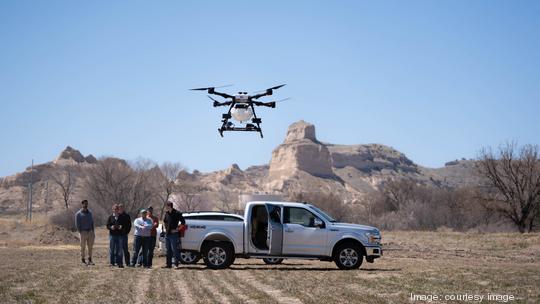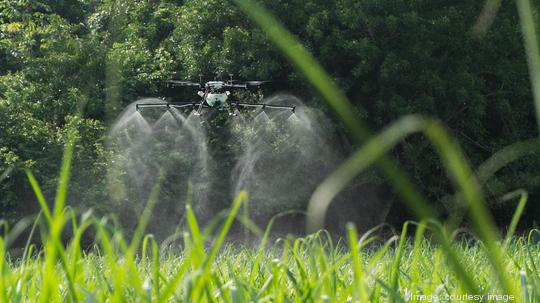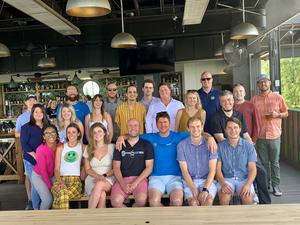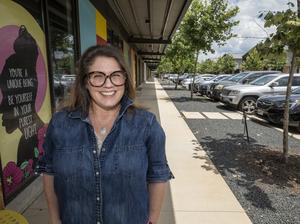
A sleep deprived Arthur Erickson was on his way back from a difficult project using drones to spray thousands of acres of a melon farm in Honduras in 2019. Running on fumes, he hopped in a cab to the airport to head back to Texas.
Little did the startup co-founder know, a protest over education and government spending was raging. As the cab got close to the airport, Erickson started to realize the protest was intense. He started seeing people wearing gas masks. Still, he figured he'd slip by the protest and into the airport.
"It turned out the airport was actually the epicenter of the protest, and the police had formed a barrier around the airport, specifically," the Hylio co-founder and CEO said. "And the protestors were attacking the barricade for whatever reason."
He decided to try to get by the protest. When he got near the police line, authorities started shooting tear gas into the crowd.
"It's very effective, even if you're not very close to it," he recalled. "My eyes flooded, my nose got all runny ... and me along with thousands of others ran into this mall that's adjacent to the airport."
The protest continued through the day and night while Erickson hunkered down in the mall for safety before flying out the next day.
"That's just one of the things I ran into as an entrepreneur down there that I don't think very many people experience in their tech startup journeys," he said.
To be sure, Guatemala, Honduras, El Salvador and Costa Rica aren't your typical test markets for U.S. tech startups. But that's been the case for Hylio, a startup formed at the University of Texas at Austin in 2018 that uses AI and drones to apply treatments to a wide variety of plants and crops.
The Hylio teams has also been confronted by gangs in El Salvador who wanted to know if the drones were recording video and others who robbed them of laptops and other supplies. And they had to work through the sometimes tricky government relations in Central American countries to get approval to fly their drones.
It was a big foray for a startup largely made of recent college graduates. But Erickson said the team is ambitious, saw an opportunity and went for it.
"There are people there that are busting their butts, working every day to grow food for their communities and for export, and there's just a better way of doing it with drones," he said. "And so we wanted to get in there and solve that problem, scratch that itch. And we were kind of arrogantly not thinking about the repercussions."
Three years later, and Hylio has set up an office in Richmond, near Houston, and continues to grow. It has reached new customers through agricultural trade shows, farming outfitters and word of mouth. It now counts the largest ranch in Texas, King Ranch, as one of its customers. Crews there are currently pilot-testing one of Hylio's drones. They've also learned a lot about operating in Central America and have improved their Spanish language skills.

"At this point, I feel like we're we're pretty accustomed to it and know kind of our head's down so don't walk into the wrong alleys and wrong part of town," Erickson said.
Meanwhile, Hylio is in the midst of a crowdfunding campaign on StartEngine where it has raised nearly $200,000 so far en route to raising up to $1 million. It has more than four months left in its campaign. The company, which was part of the Capital Factory accelerator, previously raised about $240,000 in angel funding. Its StartEngine campaign shows it had more than $1 million in 2020 sales.
While Hylio faces significant competition from other drone and agtech startups, Erickson said he hopes more startups like Hylio can grow on their own with support from VCs, instead of people assuming such companies will just be acquired by major manufacturers like John Deere.
"I think ag, as an industry, especially for investors, is totally ignored," he said. "It's because people are living in Silicon Valley or New York, and they don't really interact with ag farmers."
Currently, the company's team of about 20 people has been increasing focus on its artificial intelligence and data. It's using AI to identify nutrient deficiencies and developing self-sustaining drone stations.
"The ultimate goal, hopefully by the end of 2022 or early 2023, is that we will have a complete system for the drone that has no human input needed," he said. "So just imagine dropping a container like a shipping container that has two or three drones in it, but also has and pumps and stuff."
But, he said, it's not quite there — yet.
"The human still needs to be there," Erickson said. "Then, another point is that the FAA still requires there to be a human pilot there, physically."
Editor's note: The founder clarified after publication the correct date of the protest in Honduras.







